#anti J.K Rowling
Note
explain your fav underrated marauders era character? and tag with #underratedmarauders
I want to say Mary Macdonald. Because not much is known about her, especially in the books. Only mentions in the Harry Potter books, and we can assume that she was close with the marauders or knew them through Lily since she knew Lily and was also a Gryffindor
Plus, the popular headcanon that she obliviated herself during the war. To do something like that to yourself and if her friends saw her on the street and tried to see how she was doing, but she didn't remember them is heartbreaking yet interesting.
I want to see more headcanons on Mary and what her life is like with the marauders and if she slowly comes back to the wizarding world or not. The fans do it for everyone else.
Anyway, thanks for asking the question, anon
#underratedmarauders#harry potter#hp fandom#hp#harry potter fandom#hp imagine#hp marauders#hp thoughts#mary macdonald#harry potter world#wizarding world#first wizarding war#the marauders era#marauders era#the marauders#marauders#harry potter series#harry potter imagine#harry potter thoughts#harry potter marauders#lily evans#gryffindor#gryffindor pride#j.k. rowling#anti j.k rowling#hp hcs#hp headcanon#harry potter characters#hp characters#marauders fandom
23 notes
·
View notes
Text
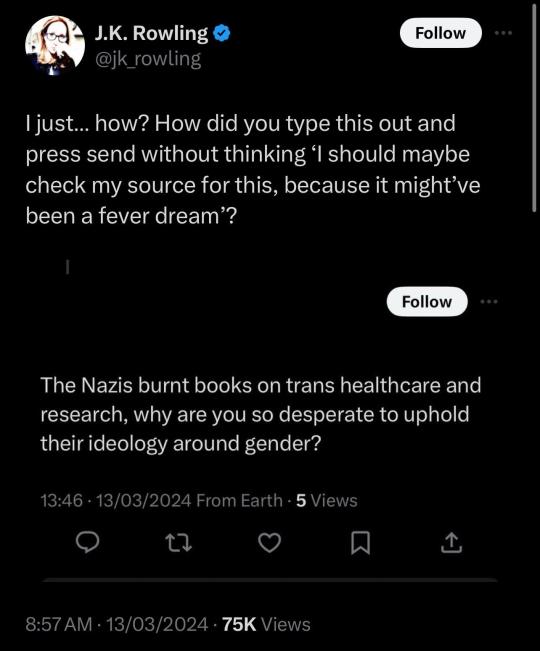
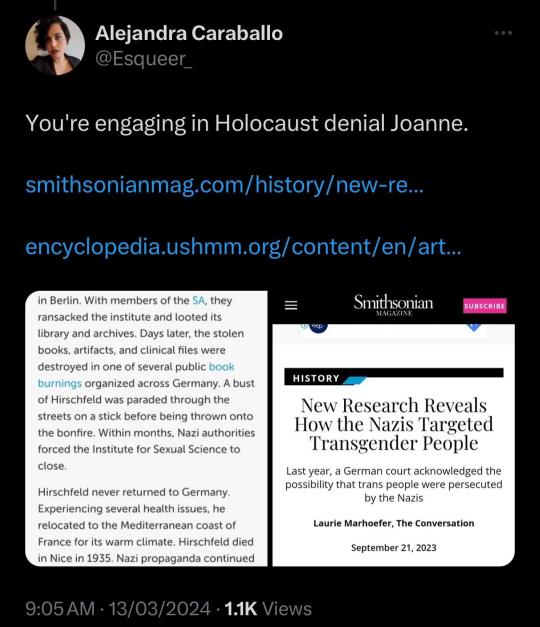
Edit:holy fuck it gets worse
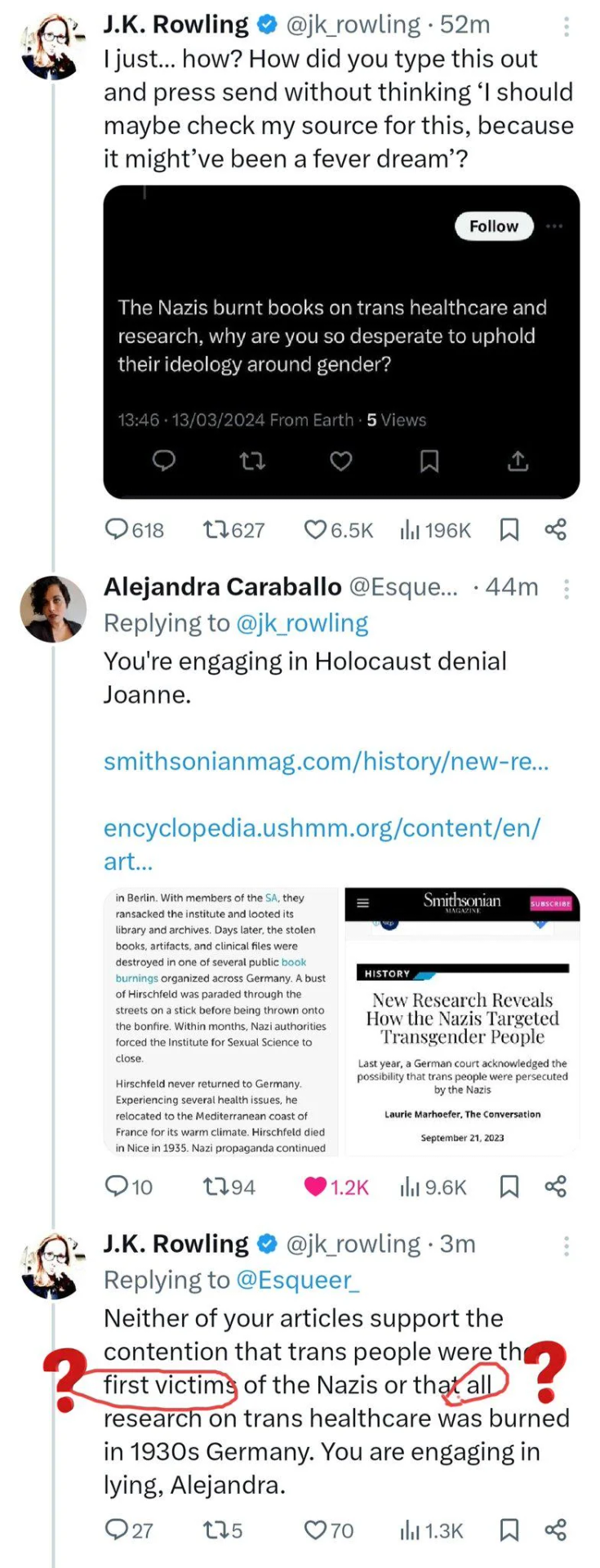
#anti jkr#anti J.K Rowling#Terfs dni#transphobia cw#cw jk rowling#anti terf#cw holocaust denial#cw shoah denial#twitter screenshot
14 notes
·
View notes
Text
I'm so sad CallMeKevin played the Nazi Terf game because I genuinely liked him and enjoyed his content
Also he disabled comments on the video so I don't think it's a "he didn't know what he was getting into" situation
This is the polar opposite of this meme
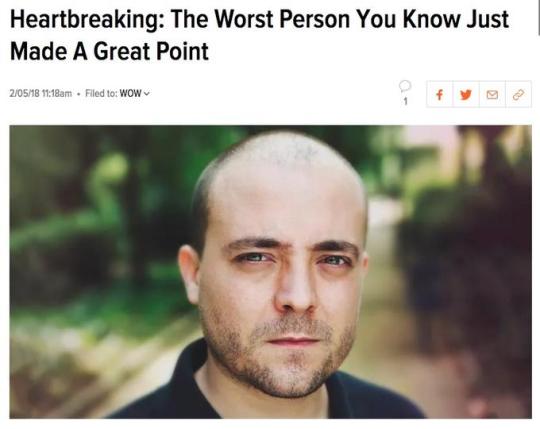
Edit: he blocked comments because they were horrifically transphobic, and apologised on Reddit for playing the game. Crisis over!!
#hogwarts legacy#fuck hogwarts legacy#anti hogwarts legacy#anti rowling#tw antisemitism#tw transphobia#tw terfs#fuck rowling#fuck harry potter#fuck j.k. rowling#anti j.k rowling#callmekevin
40 notes
·
View notes
Note
the sacred 28 is peak jkr tbh. We learn nothing about progress or how things changed for halfbloods, muggleborns, squibs, etc, but years after the series ends we get more pureblood focus, like why did this even need to exist beyond her racism huh?
Sorry anon, I don't know if you were expecting solidarity or agreement from me, but I...don't really have any to offer.
...Really? We're going to presume she's a blood purist in her real life politics because she added a bit of in-universe world-building to her cash cow like, ten years ago? (I mean...she might be, but this isn't proof.) It is not surprising that the Pureblood Directory exists. Nor is it proof of anything. I actually think it's kind of neat. I like that we don't know who wrote it. That it has inconsistencies and flaws. I am not remotely surprised that such a piece was published in this world. And I'm not going to assume anything about the author based on this update because...honestly, that's nuts.
Trying to guess a writer's real life politics based on the nuances they include in the sub-creationist fantasy world they craft is...a losing game.
I don't know why the fandom feels the need to keep doing this. Not saying this is you, anon (though you kind of give that impression) but some of the HP fans (or "former fans" if you like) are fixated on dissecting the book and trying to find traces of the person Rowling is now in a narrative she wrote twenty years ago. You guys really don't need to keep inventing new reasons to hate her when there's perfectly good transphobia already out in the open. Transphobia that she keeps doubling down on.
Gotta be honest...I don't think this is helping. Criticize her for her actual bigotry and the damage she's causing, sure. But people will choose to focus on the books "supporting slavery" through the House Elves or featuring a "trans stereotype" with Rita Skeeter...all of it feels like people are reaching. No, the series isn't homophobic just because Dumbledore's sexuality could have been handled better. It isn't racist just because Cho Chang has two last names. (This is just a side note but she's not explicitly Chinese...or even explicitly Asian. They never confirm her race in the text. I mean, it's pretty clear that she is, I'm just saying.)
We don't need to waste time on this stuff. Rowling is actually hurting people with bigotry that she actually believes in. Let's focus on that instead of trying to piece together a dossier about how she was "always" awful. I honestly don't think that's the case, but it doesn't matter anyway. When I see posts like these, it frankly just comes across as people who have been burned by Rowling trying to "ruin" Harry Potter for the allies who still feel a connection to the series...if so, that's not going to work, and there are productive things you can do. Follow Daniel Radcliffe's example, he is slaying as a human being.
#To be clear#Fuck J.K. Rowling#Ten ways from sunday#But Anti Rowling sentiment is kind of crapshoot#People choose to pick apart the books#Rather than the actual harm she's causing in present day#Harry Potter is immortal you guys#It's too successful and beloved to crash#Also it's actually good and not even problematic?#But that's not the point anyway#J.K. Rowling#Harry Potter#Anti JKR#Anti J.K Rowling#Harry Potter Books#Transphobia#Trans rights#Daniel Radcliffe#Oh that reminds me#Rowling apparently denounced him and Emma#Even though he never even explicitly called her out#Apparently she's willing to give up everything for this “cause”#So my hope of her seeing the error of her ways is a dying ember
4 notes
·
View notes
Text

Good
#good things#good omens#good morning#goodnight#good#joanne rowling#jk rowling#anti jkr#fuck jkr#screw jkr#jkr#j.k. rowling#terfsruntumblr#terfs#terfism#terfbreaking#terf#fuckterfs#harry potter#antiterf#trans exclusionary radical feminist#trans exclusionists#ausgov#politas#auspol#tasgov#taspol#australia#fuck neoliberals#neoliberal capitalism
119 notes
·
View notes
Text
A Retrospective on Harry Potter
Why did I like it in the first place? What about it worked? Where do I go from here?
I have decided to give up Harry Potter.
J.K. Rowling’s reputation now stinks to high heaven. At this point, she is quite indefensible. And even if that weren’t the case, she is not someone that I would want to associate with anyway. Meanwhile, the internet has not only turned against her, but against Harry Potter itself. An innocent question on Reddit, about which Hogwarts Houses the ATLA characters would be in, got downvoted to oblivion. Innumerable Tumblr threads insist that fantasy fans should get into literally anything else (suggestions include Discworld, Earthsea, The Wheel of Time, and Percy Jackson). And now that Harry Potter is no longer a sacred cow, there has been a recent slew of video essays that rip it to shreds, attacking it for its poor worldbuilding, unoriginality, and the problematic ideas baked into the original books (like the whole SPEW thing), etc. Those criticisms always existed, but now they’re getting thrown into the limelight.
It pains me to see such an ignoble downfall of Harry Potter’s reputation. If Rowling had just kept her damn mouth shut, Harry Potter would have aged gracefully, becoming a beloved children’s classic. I'd still plan to introduce it to my own kids one day (after Rowling dies and the dust settles). It’s not surprising that not all aspects of it have aged well, since it’s been more than twenty years since its original publishing date, and everything starts to show its age after that long. I acknowledge that most of the criticisms of the series that I’ve seen lately are valid, and I’ve read plenty of better books. And yet, when I return to the books themselves, even with the knowledge of who JKR really is inside my head, I still really enjoy reading them! There’s still a lot about them that I think works!
None of the other things I’ve read have had as collossal of an impact upon my identity, my values, and my own writing as Harry Potter. It’s hard to move on from it, not just because it’s something I enjoy, but because I have to literally extract my identity from it. I don’t know who I’d be without Harry Potter. I don’t know what my work would look like without Harry Potter. I don’t know how to carry it with me as just another piece of media that I like, as opposed to a filter for who I am as a person. So, with all that in mind, I have to ask myself why I liked Harry Potter so much in the first place. If I’m going to move on from it, then I have to be able to define and isolate the things about it that I want to keep with me. Something about it obviously worked, on a massive scale. So what was it?
It’s not the worldbuilding. The worldbuilding is objectively quite terrible, especially in comparison to that of other fantasy writers who knew what they were doing. At best, it’s inconsistent and poorly thought-out, and at worst it’s insensitive or even racist. Is it the characters? The characters are, in my opinion, one of the stronger parts of the story. But I felt very called-out by one of the many online commentators, who said that anyone who identifies with Harry is too cowardly to write self-insert fic. (I do not remember who said it or even which site it was on, but I distinctly remember the phrase, “Reject Harry Potter, embrace Y/N.”) The reason why people get so invested in Harry Potter’s characters is because they’re easy to project upon, and it’s possible that my love of Harry comes more from over a decade’s worth of projection than anything else. The incessant arguments over characters like Snape, Dumbledore, and James Potter ultimately stem from the fact that these characters do not always come across the way Rowling wanted them to. As for the writing itself, it’s decent, but not spectacular. Harry Potter is something of a sandbox world, with less substance than it appears to have and a crapton of missed opportunities, making it ripe for fanfic. For more than ten years, I’ve been doing precisely that — using Harry Potter as a jumping-off point to fill in the gaps and develop my own ideas, some of which became my original projects.
So what does Harry Potter actually have that sets it apart? Why are people so desperate to be part of Harry Potter’s world if the worldbuilding is bad? What, specifically, is so compelling about it? I think that there’s one answer, one thing that is at the center of Potter-mania, and that has been the underlying drive of my love of it for the past decade and a half: the vibe.
Harry Potter’s vibe is immaculate.
You know what I mean, right? It’s not actually a product of any specific trope, but rather a series of aesthetic elements: The wizarding school in a grand castle, with its pointed windows and torches and suits of armor, ghosts and talking portraits and moving staircases, its Great Hall with floating candles and a ceiling that looks like the night sky, its hundreds of magically-concealed secret doorways. Dumbledore’s Office, behind the gryphon statue, with armillary spheres in every single shot. Deliberate archaisms that evoke the Middle Ages without going as far as a Ren Faire: characters wearing heavy robes, writing with quills and ink on parchment instead of paper, drinking from goblets, decorating with tapestries. Owls, cats, toads. Cauldrons simmering in a dungeon laboratory. Shelves piled with dusty tomes, scrolls, glass vials, crystal balls, hourglasses. Magical candy shaped like insects and amphibians. A library with a restricted section. A forbidden forest full of unicorns and werewolves. That is the Vibe.

There are five armillary spheres just in this shot. They are unequivocally the most Wizard of tabletop decor.
There’s more to it than just the aesthetic, though. The vibe is present in something that writers call soft worldbuilding.
There’s a phrase that writers use to describe magic systems, coined by Brandon Sanderson: hard magic and soft magic. Sanderson’s first law of magic is, “An author’s ability to solve problems with magic is directly proportional to how well the reader understands said magic.” A hard magic system has clearly-defined rules — you know where magic comes from, how it works and under which conditions, how the characters can use it, and what its limitations are. Examples of really good hard magic systems include Avatar: The Last Airbender and Fullmetal Alchemist. If the audience doesn’t understand the conditions under which magic can work, then using magic to get out of any kind of scrape risks feeling like the writer pulled something out of their ass. It begs the question, “Well, if they could do that, then why didn’t they do that before?”
You may come away from that thinking that having clearly-defined rules is always better worldbuilding than not having them, but this isn’t the case. Soft magic isn’t fully explained to the audience, but that doesn’t matter, because it isn’t trying to solve problems — its purpose is to be evocative. Soft magic enhances the atmosphere of a world by creating a sense of wonder. If your everyman protagonist is constantly running into cool magical shit that they don’t understand, then the world feels like it teems with magic, magic that is greater and more powerful than they know, leaving lots of secrets to uncover. Harry Potter, at least in the early books, excels at this. The soft magic in Harry Potter is what got me hooked, and I think it’s what a lot of other people liked about it, too.
The essence of soft magic is best summed up by this scene in the fourth film, in which Harry enters the Weasleys’ tiny tent at the Quidditch World Cup, only to find that it’s much bigger on the inside. His reaction is to smile and say, “I love magic.”

That’s it. That’s the essence of it. You don’t need to know the exact spell that makes the tent bigger on the inside. You don’t need to know how Dumbledore can make the food appear on the table with a flick of a wand, or how he can make a bunch of poofy sleeping bags appear with another flick. You don’t need to know how and why the portraits or wizard cards move. You don’t need to know how wizards can appear and disappear on a whim, or what the Deluminator is, or where the Sword of Gryffindor came from. You don’t need to know how the Room of Requirement works. Knowing these things defeats the purpose. It kills the vibe, that vibe being that there is a large and wondrous magical world around you that will always have more to discover.
One of the best “soft magic” moments in the books comes early in Philosopher’s Stone, when Harry is trying to navigate Hogwarts for the first time:
There were a hundred and forty-two staircases at Hogwarts: wide, sweeping ones; narrow, rickety ones; some that led somewhere different on a Friday; some with a vanishing step halfway up that you had to remember to jump. Then there were doors that wouldn't open unless you asked politely, or tickled them in exactly the right place, and doors that weren't really doors at all, but solid walls just pretending. It was also very hard to remember where anything was, because it all seemed to move around a lot. The people in the portraits kept going to visit each other, and Harry was sure the coats of armor could walk.
—Philosopher’s Stone, Chapter 8
Many of these details don’t come back later in the series, which is a shame, because this one paragraph is super evocative! It establishes Hogwarts as an inherently magical place, in which the very architecture doesn’t conform to normal rules. Hogwarts seems like it would be exciting to explore (assuming you weren’t late for class), and it gets even better when you learn about all the secret rooms and passages. The games capitalized on this by building all the secret rooms behind bookcases, mirrors, illusory walls, etc. into the game world, and rewarding you for finding them. The utter fascination that produces is hard to overstate.
Another one of the most evocative moments in the first book is when Harry sees Diagon Alley for the first time, after passing through the magically sealed brick wall (the mechanics of which, again, are never explained). This is your first proper glimpse at the wizarding world and what it has to offer:
Harry wished he had about eight more eyes. He turned his head in every direction as they walked up the street, trying to look at everything at once: the shops, the things outside them, the people doing their shopping. A plump woman outside an Apothecary was shaking her head as they passed, saying, “Dragon liver, seventeen Sickles an ounce, they're mad....”
A low, soft hooting came from a dark shop with a sign saying Eeylops Owl Emporium — Tawny, Screech, Barn, Brown, and Snowy. Several boys of about Harry's age had their noses pressed against a window with broomsticks in it. "Look," Harry heard one of them say, "the new Nimbus Two Thousand — fastest ever —" There were shops selling robes, shops selling telescopes and strange silver instruments Harry had never seen before, windows stacked with barrels of bat spleens and eels' eyes, tottering piles of spell books, quills, and rolls of parchment, potion bottles, globes of the moon....
—Philosopher’s Stone, Chapter 5
What works so well here is the magical weirdness of wizardishness juxtaposed against normalcy. Eeylops Owl Emporium is just a pet shop to wizards. A woman makes a very mundane complaint about the price of goods, but the goods happen to be dragon liver. Broomsticks are treated like cars. All of these small moments contribute to the feeling of the wizarding world being alive, inhabited, and also magical. It gets you to ask the question of what your life would be like if you were a wizard. What do wizards wear? What do they eat? What do they haggle over and complain about? What do they do for fun?
In Book 3, Harry enjoys Diagon Alley for a few weeks when he suddenly has free time, and we get to experience the wizarding world in a state of “normalcy,” when he isn’t trying to save the world. He gets free ice creams from Florean Fortescue, gazes longingly at the Firebolt, and engages with delightfully weird people. He’s a wizard, living a (briefly) normal wizard life among other wizards in wizard-land. And that is fun. It’s so fun, that people want that experience for themselves, enough for there to be several theme parks and other immersive experiences dedicated to recreating the world of Harry Potter.
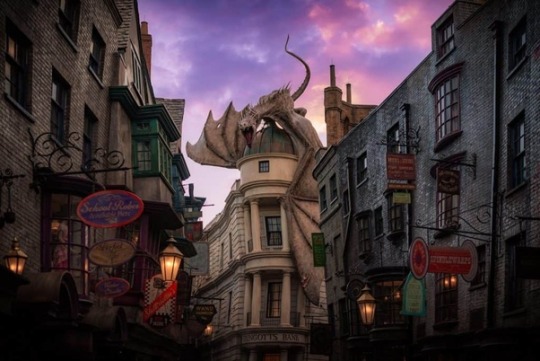
One of the greatest things about Universal was its phenomenal attention to detail. You can hear Moaning Myrtle’s voice in the women’s bathroom, and only the women’s bathroom. The walls of the Three Broomsticks have shadows of a broom sweeping by itself and an owl flying projected against the wall, so convincingly that you’ll do a double take when you see it. Knockturn Alley is down a little secret tunnel off of the main street, and that’s where you have to go to buy Dark Arts-themed stuff. It’s really well done.
Another thing that contributes to the vibe, in my opinion, is that the wizarding world is slightly macabre. They eat candy shaped like frogs, flies, mice, and so forth, and they have gross-tasting jellybeans. In the film’s version of the Diagon Alley sequence above, there’s a random shot of a pet bat available for purchase. In the third film, when Harry is practicing the Patronus Charm with Lupin, the candles are shaped like human spines. In the first book, this is Petunia’s description of Lily’s behavior after she became a witch:
Oh, she got a letter just like that and disappeared off to that-that school, and came home every holiday with her pockets full of frog spawn, turning teacups into rats. I was the only one who saw her for what she was — a freak!
—Philosopher’s Stone, Chapter 4
I remember reading this for the first time, and it just kind of made intuitive sense to me. I suppose it fits into the “eye of newt and toe of frog” association between magical people and gross things, but somehow it works. Unfortunately, this is retconned later with the knowledge that wizards can’t use magic outside school, but before that limitation gets imposed, the idea of Lily amusing herself by turning teacups into rats seems like an inherently witchy thing to do.
That association between magic and the macabre shows up elsewhere, as well. In The Owl House, Luz’s interest in gross things is one of the things that marks her as a “weirdo” in the real world. When she goes to the magical world of the Boiling Isles, weird and gross stuff is absolutely everywhere. That world’s vibe leans more towards the macabre than the whimsical, but it works because you sort of expect the gross stuff to exist alongside the concept of witches, and that they would be an intrinsic part of the world they inhabit. You don’t question it, because it’s part of the vibe.
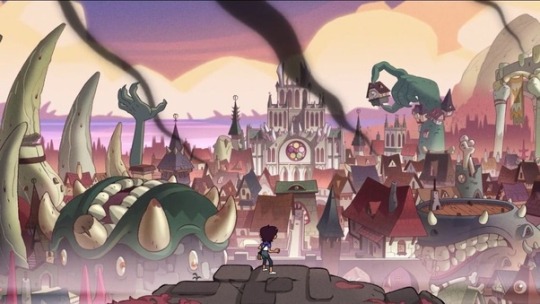
(The Owl House is one of the few things I’ve encountered that has a similar vibe to Harry Potter, but it’s still not the same vibe. In fact, The Owl House outright mocks the expectation that magical worlds be whimsical, and directly mocks Harry Potter more than once. The overall vibe is much closer to Gravity Falls.)
The Harry Potter films utilize a lot of similar soft worldbuilding with the background details, especially in the early films that were still brightly-colored and whimsical. For example, the scene in Flourish and Blotts in the second film has impossibly-stacked piles of books and old-timey looking signs describing their subjects, which include things like “Celestial Studies” and “Unicorns.” When Harry arrives in the Burrow in the same film, one of the first things he sees is dishes washing themselves and knitting needles working by themselves, taking completely mundane things and instantly establishing them as magical. In that Patronus scene with Harry and Lupin, the spine-candles and a bunch of random orbs (and the obligatory giant armillary sphere) float around in the background. One small detail that I personally appreciate is the designs on the walls above the teacher’s table in the Great Hall, which are from an alchemical manuscript called the Ripley Scroll:

It’s all these little things that add up to produce The Vibe.
Obviously, much of the vibe is expressed very well in John Williams’ score for the first three Harry Potter films. The mystical minor key of the main theme, the tinkly glockenspiel, the strings, the rising and falling notes that mimic the fluttering of an owl, the flight of a broomstick, or the waving of a wand. That initial shot of the castle across the lake as the orchestra swells, as the children arrive at their wizarding school:
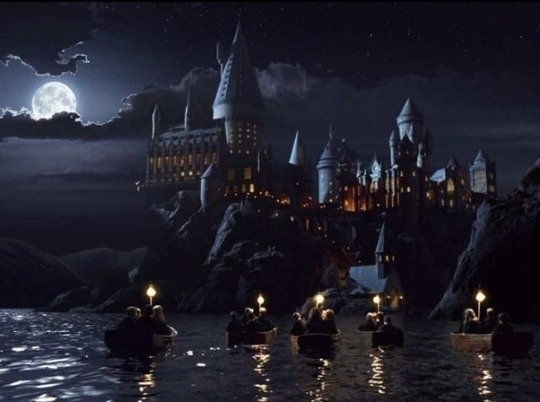
If you grew up with Harry Potter, just looking at this image gives you The Vibe. The nostalgia hit is definitely part of it, but The Vibe was already there, back when you were a child and you didn’t have nostalgia yet.
In my opinion, only Williams’ score captures this vibe — the later films, though their scores are very good, do not. But the soundtrack of the first two video games, by Jeremy Soule (the same person who did Skyrim) absolutely nails it. This, right here, is Harry Potter’s vibe, condensed and distilled:
youtube
This is why I feel invalidated by the common advice “just read another book.” I have read other books. I’ve read plenty of other books, many of which are wonderfully written and have left an impact on me. But there’s still only one Harry Potter. To date, there’s only other book that has filled me with a similarly intense longing for a fictional place, and that is The Night Circus by Erin Morgenstern. That book deliberately prioritized atmosphere over everything else in the story, and actually lampshades this in-universe. The Night Circus has a plot and it has characters, but it’s not about its plot or characters. It’s about the setting and its atmosphere. It swallows you up and transports you to a fictional place that is so evocative and so magical that you just have to be part of it or you’ll die. And even then, The Night Circus has a different kind of vibe from Harry Potter. In this particular capacity, there’s nothing else like Harry Potter.
The thing is, I don’t think Rowling was being as deliberate as Erin Morgenstern. (In fact, given many of Rowling’s recent statements, I question how many of her creative choices were deliberated at all.) She was throwing random magical stuff into the background without thinking too hard about it, which works when you’re writing a kids’ story, but stops working when you try to age it up. Actually, scratch that — soft worldbuilding is definitely not just for kids! The Lord of the Rings has a soft magic system, for crying out loud, and Tolkien is the original archmage of worldbuilding. Don’t listen to anyone who tells you that prioritizing atmosphere over meticulousness is bad worldbuilding. That is a valid way to worldbuild! Not everything needs to be clearly explained, not everything needs to make sense. The problem is that Harry Potter doesn’t balance it well. Certain things do have to be explained in order for the magic to play an active role in the story (and the setting of a magic school lends itself to that kind of explanation), but no rules are ever established for the kinds of magic that need rules. When you begin thinking about the rules, you’re no longer just enjoying the magic for what it is. At worst, you begin running up against the Willing Suspension of Disbelief.
It wasn’t actually the “aging up” of the story that did it in, per se, but rather, the introduction of realism. The early books were heavily stylized, and the later books were less so. A heavily stylized story can more easily maintain the Willing Suspension of Disbelief. That’s why, for example, you don’t ask why the characters are singing in a musical — you just sort of accept the story’s outlandish internal logic, and the inherent melodrama of it doesn’t take you out of the story. Stylized stories are more concerned with being emotionally consistent over being logically consistent. The later Harry Potter books changed their emotional tone, but without changing the worldbuilding style to compensate.
In addition to the more mature themes and darker tone, Harry Potter introduced more realism as it went, but Rowling did not have the worldbuilding chops to pull this off. There’s the basic magic system stuff: When you begin thinking about it too hard, something like a Time-Turner stops being a fun magical device, and starts threatening to break the entire story. Then there’s the characters: Dumbledore leaving Harry on the Dursleys’ doorstep in the first book is an age-old fairy tale trope that goes unquestioned, but with the introduction of realism in the later books, it suddenly becomes abandonment of a child to an abusive family. The exaggerated stereotypes of characters like the Dursleys become tone-deaf. The fun school rivalry of the House system is suddenly lacking in nuance. And then there’s the shift in tone: The wizarding world that we were introduced to as a marvellous place is revealed to be dystopian. You start thinking about how impractical things like owl messengers are, you start wondering if Slytherin is being unjustly punished, the bad history appears glaringly obvious, the quaint archaisms become dangerously regressive. Oh, and the grand feasts are made through slave labor! The wizarding world suddenly feels small and backward instead of grand and marvellous. J.K. Rowling’s bigotry throws it all into an even harsher light.
This is why I’ve always preferred the early books and films to the later ones. There’s a lot of things I like about the later ones, but they’re not as stylized — they don’t have The Vibe. Thinking about things too hard is just a necessary condition of adulthood, but it’s still possible to tell a dark, mature story that is highly stylized. I really think JKR could have better pulled off that shift if she was a more competent worldbuilder. But it is painfully obvious that she did not think things through, and probably didn’t understand why she had to. In her defense, she did not know that her story would end up being one of the most scrutinized of all time. As it stands, her strength in worldbuilding was in the softer, smaller, deliberately unexplained moments of magic that were there just to provide atmosphere. And there were less and less of those as the books went along.
Pretty much all the Harry Potter-related content released since the last film — including Cursed Child, Fantastic Beasts, Hogwarts Mystery, Hogwarts Legacy, Magic Awakened, and that short-lived Pokemon Go thing — have been unsuccessful attempts at recreating The Vibe. In fact, the only piece of supplemental Potter content that I think had that Vibe down pat was the original Pottermore, back when it was more of an interactive game. And of course that got axed. That was right around the time things started going downhill.

Some of the art from Pottermore’s original Sorting quiz.
So what now? Well, that’s the question.
I think I can safely say that The Vibe was the reason I liked Harry Potter. It’s the thing I still like the most about it. I’ve spent years chasing it, like an elusive Patronus through a dark wood. If I can capture and distill that Vibe, and use drops of it in my own work, then perhaps I won’t need Harry Potter anymore.
I'm gonna write the story that I wish Harry Potter was, and when I'm a famous author, I won't become a bigot. I'll see you on the other side.
#harry potter#harry potter fandom#harry potter analysis#j.k. rowling#jk rowling#anti jkr#fuck jkr#screw jkr#anti jk rowling#fuck jk rowling#writing#worldbuilding#soft worldbuilding#soft magic#magic system#fantasy worldbuilding#fantasy writing#moving on from harry potter#moving past harry potter#long post#wizard#hogwarts school of witchcraft and wizardry#wizarding world#vibes#analysis#Youtube
120 notes
·
View notes
Text

#it matters not what someone is born but what they grow to be - j.k. rowling#she's a real hypocrite!#tw jkr#tw jkr mention#tw transphobia mention#lgbtqtext#lgbtq text#animated text#word art#blue#pink#white#trans#trans pride#trans positivity#transgender#transgender pride#transgender positivity#anti jkr#anti transphobia#nonbinary#nonbinary pride#nonbinary positivity#trans rights#trans rights are human rights#lgbtq#lgbtq pride#lgbtq positivity#lgbtq+#lgbtqia
133 notes
·
View notes
Text
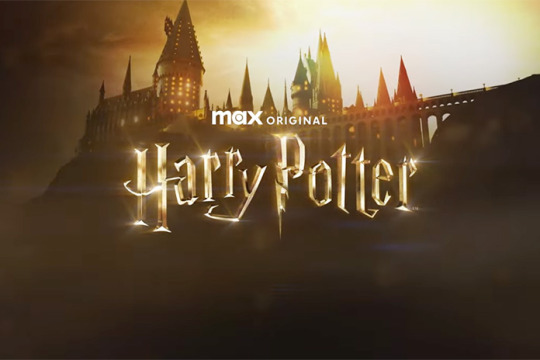
Oh GOD the fiendish David Zaslav is rebooting Harry Potter with a new "extremely faithful" adaption of the seven books. J.K. TERFling is heavily involved, she's executive producing, and they've made a TEN-YEAR COMMITMENT already.
Five Rapid-Fire Thoughts I Had in Reaction to This News:
Fuck Zaslav. (Btw, did I mention that — after deleting half of HBO Max's original content — Zaslav has now announced a price hike to the newly christened "MAX" service? As if giving a shitload of money to the planet's most notable TERF wasn't enough fuckery. FUCK that fucking shitheel.)
See below.
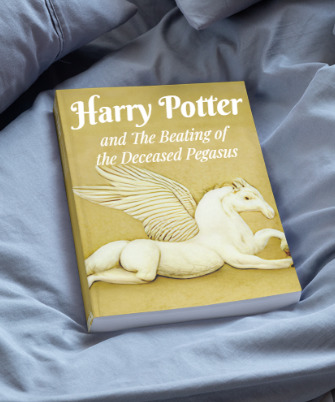
3. All y'all who were like "Boycott Hogwart's Legacy or You're Automatically a Terrible Person" or whatever because Rowling was going to make like a 1% royalty off of that game had GODDAMN BETTER boycott HBO MAX (....uh, sorry, it's just "MAX" now, I keep forgetting bc that name sucks — "HBO MAX" wasn't all that good a name to begin with IMO, but now it's worse) from here on out. YES, I know it's harder to boycott an entire streaming service that may contain OTHER content you want, but c'mon now, just bootleg anything you want off MAX in the future. (I'll help! I will send you a link or whatever if you need assistance. Message me. It's cool.) Because this is going to make her SO MUCH MORE MONEY due to involving her FAR MORE DIRECTLY. FUCK. WHY. Why did they fucking do this.
4. There are so many things in the books that are either A) poorly explained workarounds for continuity/logic issues or B) extremely problematic that the movies were actually BETTER for ignoring them. Can't wait to see the scene where every single known Time-Turner gets accidentally broken shortly after Prisoner of Azkaban in order to ensure the characters can never use time travel to fix their problems again! SUPER excited for the plotline where Hermione has to learn that she's silly and wrong for trying to free slaves because the slaves are fucking happier being enslaved! OH BOY!
5. God, a ten-year production commitment UP FRONT. I hope they lose so much money on this stupid-ass project that they wind up dragging their feet to produce future seasons for so long that the contract runs out before they've gotten farther than like, the third novel, and then it just dies on the vine. Would be HILARIOUS.
#harry potter#wizarding world#fuck david zaslav#j.k. rowling#there's a reason her initials are “JK”#it's because her existence is a fucking joke#jk rowling#anti-jkr#hbo max#streaming services#fuck zaslav#david zaslav#hogwart's legacy
469 notes
·
View notes
Text
Mira Lazine at LGBTQ Nation:
Algerian boxer Imane Khelif opened up about the hate she’s received from the far-right during their “transvestigations” of her, focusing particularly on Elon Musk’s role in the hate mobs.
[...]
Khelif has been the victim of intense hate mobs directed at her solely on the basis of transphobia and racism. It started when she defeated her opponent, Italian boxer Angela Carini, in the first round of boxing at the Olympics. Carini dropped out after being punched in the face and anti-trans bigots began to accuse Khelif of being either a trans woman or a cis man, using an accusation made by an ally of Vladimir Putin on Telegram earlier this year.
Algeria does not allow individuals to transition, and Khelif’s entire family has said that she was assigned female at birth. The International Olympics Committee has also confirmed her as cisgender.
Things only began to escalate when reference was made to when the Russia-based International Boxing Association disqualified Khelif after she defeated a Russian boxer, claiming she did not pass unspecified gender testing. However, the International Boxing Association has given no proof of the testing and has been banned from recognition by the International Olympic Committee due to instances of corruption and scandal.
Imane Khelif, the female Algerian boxer that was falsely accused of being a “male”, opens up about the experience of being a cyberbullying victim by anti-trans scum such as Elon Musk, JK Rowling, and Riley Gaines.
See Also:
The Advocate: Imane Khelif calls out Elon Musk for all the transphobic hate he sent her way
#Imane Khelif#Elon Musk#Riley Gaines#J.K. Rowling#Transphobia#Anti Trans Extremism#Women's Boxing#Women's Sports#LGBTQ+#2024 Summer Olympics#2024 Paris Olympics#Transvestigations
29 notes
·
View notes
Text
STOP TRYING TO MAKE CERTAIN CHARCATERS COMPLETELY GOOD AND CERTAIN CHARACTERS COMPLETELY BAD.
SEVERUS SNAPE? HES COOL BUT THE SNAPE STANS PLEASE STOP ARGUING WITH PPL WHO LIST SNAPE’S BAD MOMENTS. YES HE BULLIED CHILDREN AND DID A LOT OF OTHER BAD THINGS!!! BUT HE DID GOOD THINGS TOO!!
SAME WITH JAMES POTTER
THATS WHAT MAKES THE HARRY POTTER CHARACTERS SO HUMAN. STOP TRYING TO MAKE THEM COMPLETELY GOOD OR COMPLETELY BAD. IT IS SO ANNOYING.
By the way, I’m just posting this becasue I’m annoyed. I do not support J.K. Rowling in any way.
#Anti J.K. Rowling#Harry Potter#severus snape#james potter#snape#james fleamont potter#anti jk rowling
23 notes
·
View notes
Text
Names for the members of the House of Prince of Harry Potter: my Hc
Male:
Rasmus
Erasmus
Tiberius
Ulrik
Dimitri
Demetrius
Vladimir/Vlad
Ivar
Ivan
Damien
Roman
Atreus
Edgar
Craven
Draven
Corvus
Corvin
Corvinus
Morpheus
Tieran
Mordred
Cain/Kane
Raven (gender-neutral)
Ignatius
Casimir
Nikolai
Mordecai
Severin
Ezekiel
Valeriyan
Rasputin
Mortimer
Octavius/Octavian
Hades
Alexander
Voltaire
Osiris
Kieran
Augustus
Mavros
Sebastian
Colin
Edmund
Gabriel
Castor
Drystan
Jericho
Erebus
Hadrian
Thanatos
Kyrell
Cassius
Acacius
Crow/ Qrow
Corbin
Bertram
Victor/Viktor
Orev
Dorian
Nicodemus
Oberon
Hezekiah
Mortis
Azhrael
Umbra/Umbros
Ereborn
Valkhar
Aurelius
Female:
Tatiana
Seraphina
Lilith
Elvira
Dahlia
Hecate
Morgana
Morgan
Morticia
Marcellina/Marceline
Nyx
Magda
Demetria
Irina
Dominika
Sabrina
Safrina
Regina
Gwyneth
Gwyneira
Octavia
Persephone
Morana
Noxaina
Galatea
Constance
Evelyn
Belladonna
Artemis
Quintessa
Roksana
Priscilla
Marcella
Alexandria
Victoria
Selena/Selene
Gwendolyn
Guinevere
Eileen
Corvina
Coretta
Tatia
Nyssa
Irene
Francesca
Hyacinth
Susanna
Lucinda
Aviana
Urania
Aranea
Eretria
Vespera
Darci
Madeline
Nathaira
Tanith
Deyanira
Cassandra
Acacia
Lyssa
Ravenna
Melinoe
Merletta
Mystique
Raquel
Serena
Petra
Mavis
Thalia
Morwenna
Nyxara
Caladrea
Nirvanna
Obsidra
Lunaris
Luna
Draconia
Houses: Ravenclaw and Slytherin
All I got. Enjoy
#harry potter#severus snape#harry potter fandom#hp fandom#severussnape#princes family#severus prince#eileen prince#house of prince#house prince#prince family#hp#harry potter world#pro severus#severus#pro snape#snape fandom#snape#j.k. rowling#j.k rowling#fuck jkr#slytherclaw#slytherin pride#slytherpride#slytherin#ravenclaw#harry potter headcanon#hp headcanon#anti jkr#the house of prince
64 notes
·
View notes
Text
Daniel Villarreal at LGBTQ Nation:
Transphobic billionaire Elon Musk told transphobic possible-billionaire J.K. Rowling to try writing something “interesting and positive” this weekend after she shared a 709-word essay explaining her transphobic views on Musk’s social media platform, X. Musk has also repeatedly used X to promote transphobic views to his 182.3 million followers.
Musk recently saw Rowling’s April 6 post in which she shared her trans-exclusive definition of a woman and said, yet again, that trans women are a violent threat to cis women and that gender-affirming care harms children — neither of which is true.
Musk replied in a now-deleted post, “While I heartily agree with your points regarding sex/gender, may I suggest also posting interesting and positive content on other matters?”
In a May 5 post referencing Musk’s reaction, Rowling wrote, “Hahaha, just realised that I missed being advised to share more positive content yesterday.” She then linked to an article about her writing career.
Musk commented on her post, writing, “I need to be reminded of this myself from time to time.” Around the same time, Musk highlighted a post asking if robots in the future will be able to fart, shared a video from transphobic Daily Wire broadcaster Matt Walsh, and pushed the baseless claim that election fraud in the U.S. is rampant — it’s not.
Later that same day, Musk commented on a post about Rowling, writing, “Rowling rocks.”
Anti-trans extremist Elon Musk tells fellow anti-trans bigot J.K. Rowling to tone down her vigilantly anti-trans vitriol.
See Also:
PinkNews: Elon Musk just asked JK Rowling to lighten up about trans folks – yes, really
The Advocate: Transphobe Elon Musk calls out J.K. Rowling for posting transphobic content
28 notes
·
View notes
Text

Saw this on Instagram. Credit to the creator of this brilliant thing.
18 notes
·
View notes
Text
We all (hopefully) know by now that the game is horrific Nazi propaganda but I think we need to take a minute to remember that the books are antisemetic too, I think some people kinda forgot that it's been like this since the start, and that that game just really accentuated it to the point where even diehard HP fans can't deny it anymore
#anti hogwarts legacy#fuck hogwarts legacy#hogwarts legacy#anti rowling#tw antisemitism#anti j.k rowling#fuck harry potter#fuck rowling#fuck j.k. rowling#tw nazis#tw naziism
30 notes
·
View notes
Text



What has J.K. Rowling actually said about transgender people?
[Source] [Source] [Source]
13 notes
·
View notes


